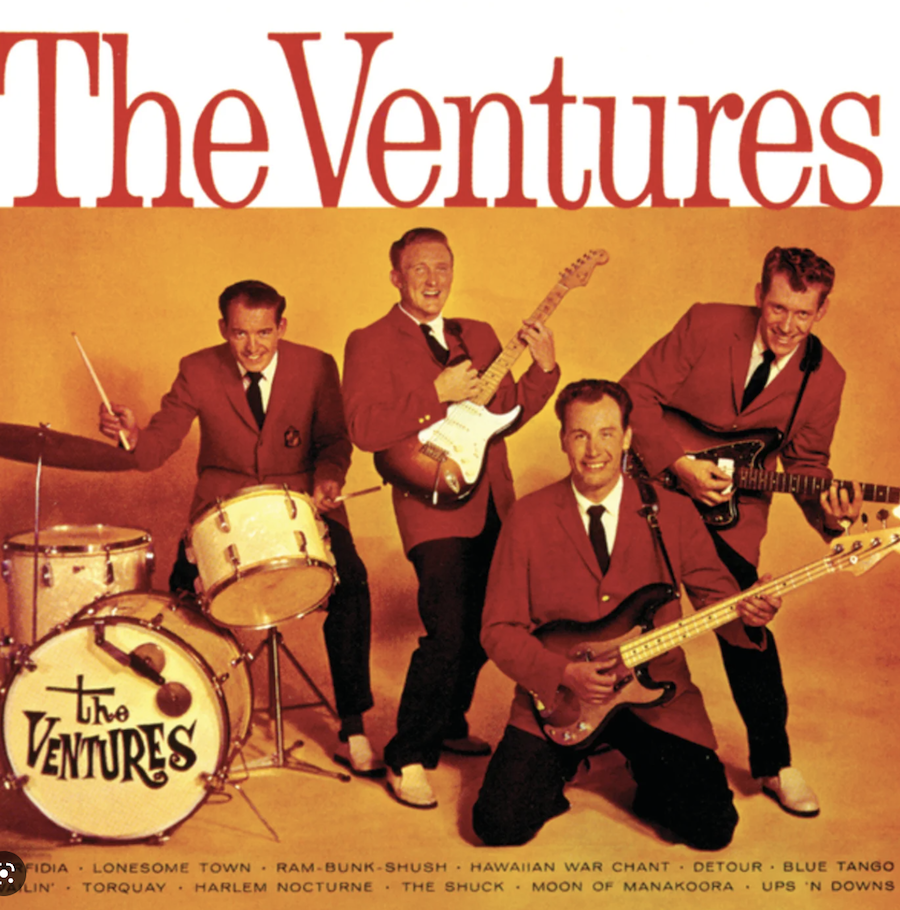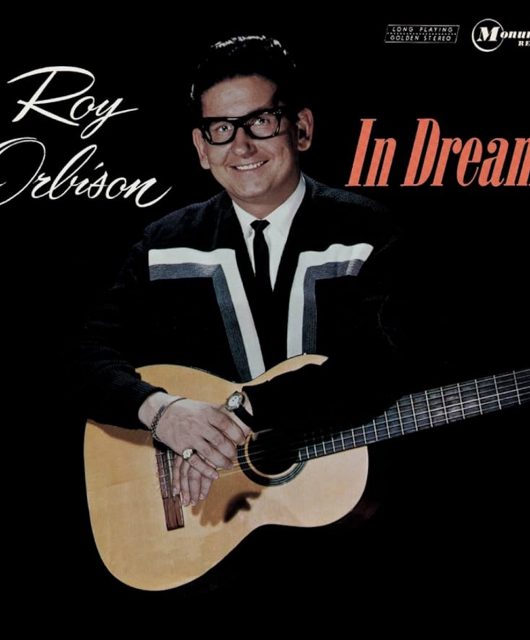In 1960 the best-selling instrumental band of all time released their debut LP, Walk, Don’t Run. Vintage Rock meets two of the longest-serving members of The Ventures to talk about their hugely successful career.
Not many bands formed in the late 1950s can say they’re still touring six decades later.
It must be said, however, that this current line-up of The Ventures doesn’t actually share any personnel with that 1958 incarnation of the group. The history, you see, of the most influential and best-selling instrumental band of all time is more complicated than the Atiyah-Singer index theorem.
So, a quick history: The Ventures were formed in 1958 in Tacoma, Washington, by Don Wilson and Bob Bogle. The first line-up was Wilson and Bogle, plus Nokie Edwards on bass and Skip Moore on drums. Moore left soon after, to be replaced by George T Babbitt Jr, who then departed to be replaced by Howie Johnson, who then left to be replaced, in 1962, by Mel Taylor. Edwards left in 1968 and was replaced by Gerry McGee, who left in 1972, only to be replaced a few years later by the man he took over from.
Mel Taylor left in 1972 to be replaced by Joe Barile, who stayed for six years, until he was replaced by a returning Mel Taylor. In 1980, Bob Spalding, later dubbed ‘the fifth Venture’ by fans, joined the band and then, in 1996, after the death of Mel Taylor, his son Leon became the new (and fifth!) drummer in The Ventures.
And that’s without even mentioning guitarists JD Hoag, Luke Griffin and Ian Spalding, or any of the four keyboardists they’ve had over the past 60-plus years. See, we told you it wasn’t simple.
Of that classic line-up of Wilson, Bogle, Edwards and Taylor, all are now sadly dead. Bogle died of non-Hodgkin lymphoma in 2009, Taylor succumbed to cancer in 1996 and Edwards passed away in 2018 following complications from hip surgery, at the age of 82.
When Wilson hung up his guitar in 2015 (he died in January 2022), that left Bob Spalding, who was just 11 when the band formed and 33 when he joined, as the senior Venture. “It’s weird to think of it like that,” he laughs. “I’ve played with all the guys for 40 years, but I was always the kid.”
The kid he may have been, but Spalding’s history with The Ventures spans half a century. Leaving the army in 1969 after one tour of duty in Vietnam – and dreaming of a career in music, he and his wife moved to Los Angeles. Before long, he’d joined a band, Sweet Pain, and signed to Liberty Records.
“I knew that The Ventures were on Liberty, too,” he says, “and so I was able to meet Mel Taylor and Bob Bogle. They invited me to recordings and rehearsals and I just sort of hung out with them.”
A few years later, after Mel Taylor had split from The Ventures, the drummer sought out the 20-something Spalding for his new band, The Dynamics.
“The Dynamics were made up of ex-Ventures,” Spalding says, “like Gerry McGee and [keyboardist] John Durrill, so that was a real thrill. It was an eye-opening, educational experience, as well as a really neat work experience. After that tour, though, The Dynamics went away, and
so we all went on to other things.”
Taylor rejoined The Ventures in 1979 and, a year later, called up his old Dynamics bandmate. “He said, ‘Would you be willing to go out and play lead with The Ventures? Nokie’s not feeling too good’. So I flew out to New York, and finished up that tour. That put me right into the family.”
For drummer Leon Taylor, well, he really was part of the Ventures family. As Mel’s son, he’d grown up around Don Wilson, Bob Bogle and Nokie Edwards, and all the various other Ventures members.
“They were really like extended family,” says Leon, from his home outside Salt Lake City. “We’d go to Don’s house for barbecues and Bob Bogle lived up in Oregon. I saw Don more than anybody else. Nokie, not so much, as he was always travelling.”
It wasn’t until the mid-90s, however, that Leon Taylor finally became professionally embedded in the group he’d watched from afar since he was a nipper. His father had often floated the idea of retiring and that Leon should take his place. Remembers Leon: “I’d always say, ‘Get out of here, you’re not ready to retire, you’ve still got a lot more years left in you!’”
Mel was diagnosed with cancer in August 1996 and died just a few weeks later. “I went and visited him in the hospital, and he asked me if I’d take over for him,” remembers Leon. “I told him it would be an honour.”
It wasn’t long before Leon found himself in Japan. “That first tour I did, I was there for four months,” he remembers. “We did around 80 shows. So that was like a rude awakening for me into the touring life. I’d been playing local clubs in LA up to that point, where being on the road was just short three-hour car rides to the venue. That first year was a little brutal for me.”
Japan has always figured prominently in the story of The Ventures. In the US and Europe, they’re a cult band, with a small but loyal following, yet in Japan they have the status of near-rock’n’roll gods.
“Being an instrumental band, there’s no language barrier,” suggests Taylor on why The Ventures are so beloved in the East. “When the guys first went to Japan, there was no electrified-type music, and the Japanese freaked out, especially the younger generation, because they hadn’t heard anything like that before. Don would always tell this story of when the band went there in 1965. When they got off the plane, there were 5,000 people waiting for them. Don thought, ‘Who else is on this plane? That can’t be for us!’”
“The group has achieved almost an iconic status in Japan,” adds Spalding. “One of the reasons for that is as they broke into Japan, one of the really smart decisions they did was to start writing music specifically for that market. They had a very good publisher over there, and they took those songs that The Ventures wrote, and placed them with popular Japanese singers. The Japanese singers had tremendous hits with these songs that The Ventures wrote the music to, and they became standards. We have to play those every year when we go to Japan.”
Though often labelled as a surf band, The Ventures have always resisted being tied to one genre. “We’re much more than surf, and I’m not putting surf down,” Don Wilson said in an interview once. “We’re either a surf group or a surf-rock group. It just so happens that we put out a surfing album [1963’s Surfing] and it’s one of the biggest albums that has ever sold. So, people identify us with that.”
Still, ‘surf music’ had something of a renaissance in the mid-90s, due in part to the plethora of surf tracks on the Pulp Fiction soundtrack. Quentin Tarantino’s movie even featured one song penned by Nokie Edwards, Don Wilson and Bob Bogle, The Lively Ones’ Surf Rider. Today, The Ventures often play Surf Baby in their set, but Spalding says if there was a spike of interest in surf, they didn’t feel it.
“It was very successful for the guys because they got royalties on Pulp Fiction,” he says, “but in terms of the additional popularity of ‘surf music’ or instrumental music, I didn’t see that much. It was kind of just a blip in the business. It certainly didn’t do anything in terms of the record sales.”
The Ventures have, over the past six decades, recorded more than 250 albums, and the long-player that started it all, Walk, Don’t Run – named after their first hit and their signature song – has just celebrated its 60th birthday. Bob Spalding was 13 when that history-making album was released.
“I’d just started playing around,” he says, “then when I heard Walk, Don’t Run, I thought, wow, it was completely different to anything I’d been exposed to from an instrumental standpoint, which was Link Wray and Johnny And The Hurricanes, mainly. The Ventures had a level of sophistication to them.”
Taylor, meanwhile, was just five when Walk, Don’t Run became a hit and was more interested in toys and comics than instrumental rock’n’roll. It was only later that he learned to appreciate the musicianship of his pa and his mates.
“The chord structure is not very complicated,” he points out, “but when you listen to it, there are all these rhythmical parts, in pretty much everything The Ventures do. People ask what makes The Ventures’ sound what it is, and it’s those rhythmical parts and having that percussive rhythmic style of playing.”
Of those 250-plus LPs, a sizable chunk of them are what we now call concept albums. Well before Sgt. Pepper’s popularised the idea of the themed album, The Ventures were putting out long-players like 1961’s The Colorful Ventures (where every track was named after a colour) and 1964’s The Ventures In Space (which boasted such sci-fi-friendly songs as Out Of Limits, Moon Child, War Of The Satellites and The Fourth Dimension).
“Putting an instrumental album together is probably one of the hardest things that you can do in the music industry, even if you’re The Ventures,” suggests Spalding. “It’s tremendously hard to try to latch on to an idea or concept and turn that into a musical product. Years ago, it was largely driven by the record company. They’d come to the band and say, ‘Hey, would you guys do a, you know, whatever…’
“But in terms of coming up with concepts for an instrumental album, we look at things that are appropriate today, and things that The Ventures are known for, and we try to come up with something that we think not only the fans will like, but also that we try to gather new fans, too.”
Excitingly, Spalding reveals that the band are currently sweating away on a sequel to that original Ventures In Space album. “It’ll be from today’s perspective,” he teases.
“It’s one of the things that we’re working on while we’re not touring.”
Leon Taylor and Bob Spalding may be in their 60s and 70s respectively, but slowing down appears to be anathema to them.
Even bands with 20-year histories don’t have the lust for writing, performing and recording that the 2023 Ventures have. After six decades and countless personnel changes, it seems they still have the enthusiasm and hunger that original line-up had back in the late 1950s.
“You know, it’s kind of neat we’re keeping the band moving,” says Spalding proudly. “It’s great we’re keeping it together and moving it forward, hopefully in new directions. We’re just so lucky The Ventures have been able to achieve this longevity.”






